Photos show what it's actually like to go to Munich's Oktoberfest, from beer-coated floors to romantic proposals
Rachael Davies

- This year, I traveled to Oktoberfest in Munich, Germany, for the third time.
- The annual two-week festival dates back to a royal wedding in 1810 and celebrates Bavarian culture.
This year, I went to Oktoberfest in Munich, Germany, for the third time.
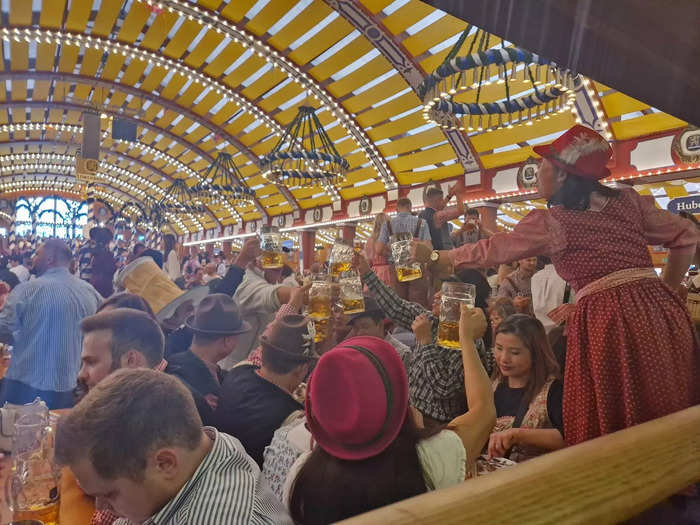
Munich's Oktoberfest typically attracts over 6 million visitors to Theresienwiese's fairgrounds every September and October, and the two-week event is beloved by locals and tourists alike.
Although Oktoberfest still maintains its roots in traditional Bavarian culture, it's come to symbolize so many things over the years. The annual beer festival and carnival has become so popular, in fact, that cities around the world — from Ontario, Canada, to Blumenau, Brazil — have hosted their own versions of the event.
I went to my third Oktoberfest in Munich this year. From getting soaked in rainwater to joining strangers atop crowded benches, here's a realistic look at a day at Oktoberfest, or, as locals call it, the Weisn.
I arrived at Theresienwiese during a busy time, so I had to stand in a long line to enter the festival grounds.
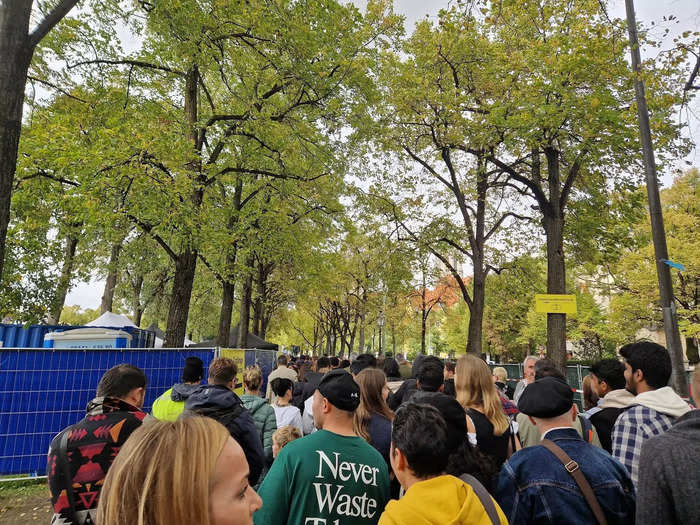
The easiest way to get to Oktoberfest from abroad is to fly directly to Munich International Airport. If you're coming from another area of Germany or a neighboring country, the city is also accessible by train and bus.
Then, you can taxi, bus, or train to Theresienwiese, where the festival is held, but be prepared to queue once you get there.
When I arrived this year, so many people flooded through the main entrance next to the train station that I had to wait in a line that looped around several times. The queue can get very long during busy times, like the weekend or the evening.
Oktoberfest officials kept the line moving and held signs that directed us where to go. And even when I got stuck in the queue, it moved pretty quickly thanks to their efficiency.
Luckily, the majority of the roads surrounding Theresienwiese were closed to cars, so it was a pretty calm entrance leading to the festival's chaos.
To beat the lines, head to Theresienwiese on a weekday or in the morning. No matter when you go, there'll still be plenty of activity inside.
Oktoberfest is over 200 years old, and the festival had nods to its history everywhere I looked.
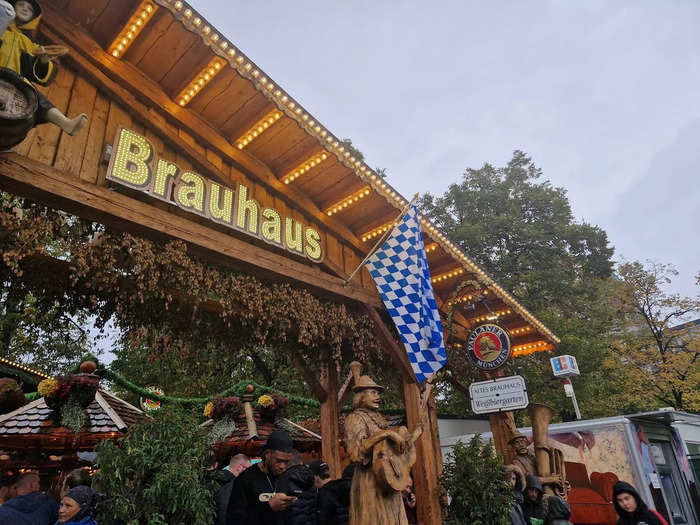
Oktoberfest dates back to 1810. King Louis I (then the crown prince of Bavaria) married Princess Therese von Sachsen-Hildburghausen at Theresienwiese, which was named after the royal bride.
Since then, Oktoberfest has become similar to a state fair and showcased the best Bavarian food and beer. I spotted blue and white Bavarian flags everywhere I looked at the festival and throughout the surrounding city.
Oktoberfest symbolizes the pride that Germans, specifically Bavarians, have in their beer, which Bavarian culture takes very seriously. Germany's beer purity law, called Reinheitsgebot, states that beer must only be made using malted grains, hops, water, and yeast.
Every major beer brewing company had its own tent at Oktoberfest.
Inside the tents, the walls and ceilings were covered in artwork.
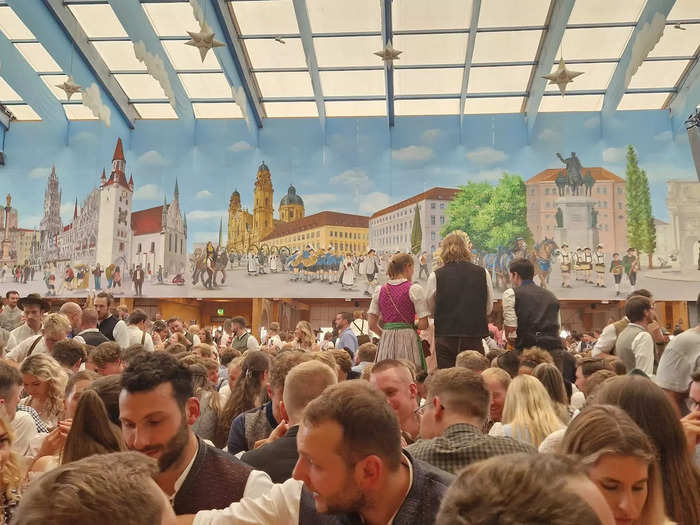
Oktoberfest was made up of dozens of tents and stalls selling food and beverages. The beer tents were the main attraction, and they were works of art in themselves.
The Hacker-Pschorr tent was perhaps the prettiest, with stunning canvas murals showing life in Munich covering the walls and ceiling.
I was on my feet the entire day either standing in line and singing on benches.
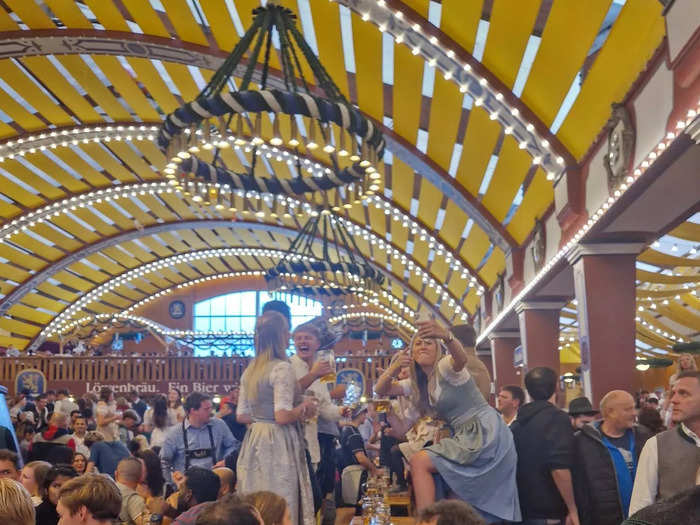
My visit to Oktoberfest required stamina and strong legs. First, I stood in the queue to get into Oktoberfest. Then, I stood on the benches inside the tents. And I stood even more as I waited to get food.
Festival-goers weren't just allowed to get up on the benches lining the beer tents to sing, dance, and drink — they were actively encouraged to do all three.
The tent floors were sticky with beer, water, and mud, so durable boots were crucial.
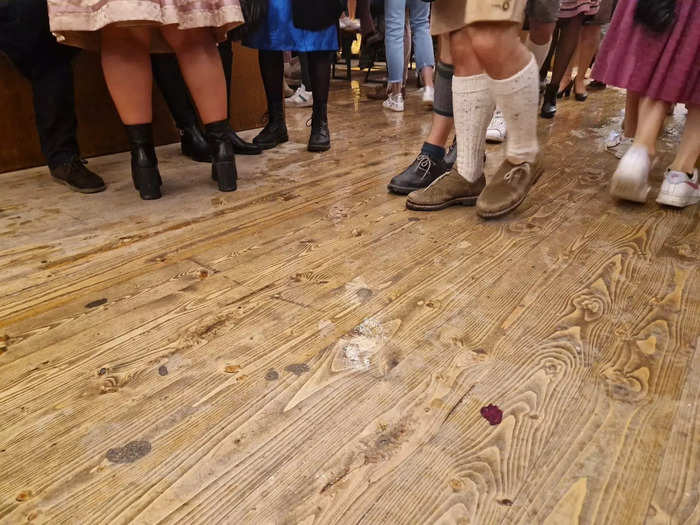
Visitors didn't wear traditional Bavarian garments, like lederhosen and dirndls, with leather shoes and knee-high socks just for fun. Sturdy footwear was essential for the festival.
The floors were sticky and covered in beer, water, and mud, so wear shoes that are fit for trekking through a field.
Plenty of people were drinking and singing in the peripheral beer tents too.
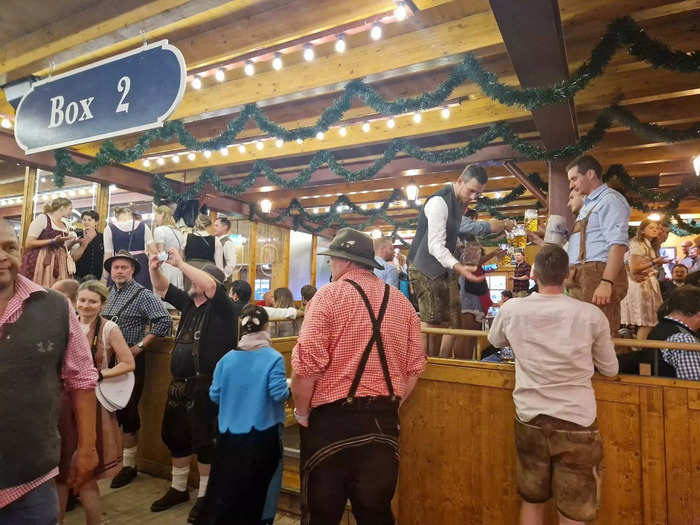
If you can't find a spot in the middle of the main tents, here's a secret: People partied just as hard on the edges.
The 100-acre fairgrounds were filled with enormous tents. The larger ones had around an 11,000-person capacity, and even the smaller ones could hold around 5,000 people. Many people gravitated toward the ones in the middle.
To maximize space, every tent had beer gardens outside. Although some were further away from the central music stages, there were still plenty of people drinking and singing there.
Water got into the tents through the ceiling, so there was nowhere to hide from the rain.
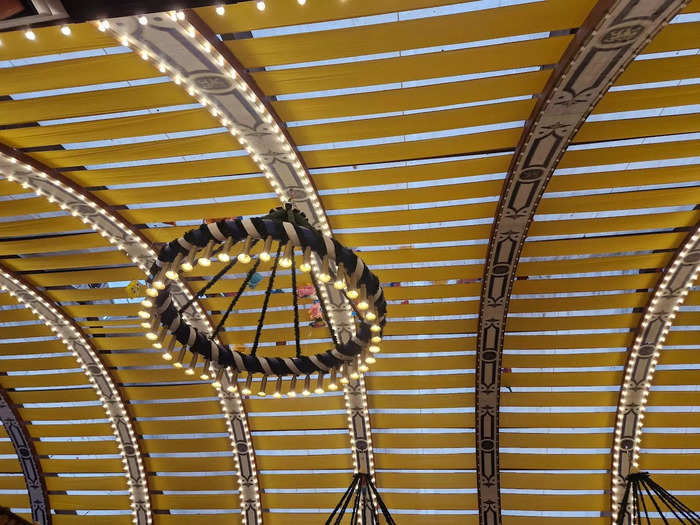
Regardless of where I was located in the tent, I was at the mercy of the elements.
Germany experiences a wide variety of weather in September and October, so I never knew which weather to expect from one hour to the next.
During my visit, I enjoyed Currywurst, bite-sized sausage seasoned in curry ketchup, in the sunshine and wished I'd brought sunglasses. But later, the heavens opened up, and I was forced to join the throngs of people pushing into the tents for cover.
When it started to rain, the tents were packed, and the gap-filled roofs didn't keep all of the water out. So, be prepared to get wet.
Metal trolleys filled with plates and glasses plowed through the crowds.
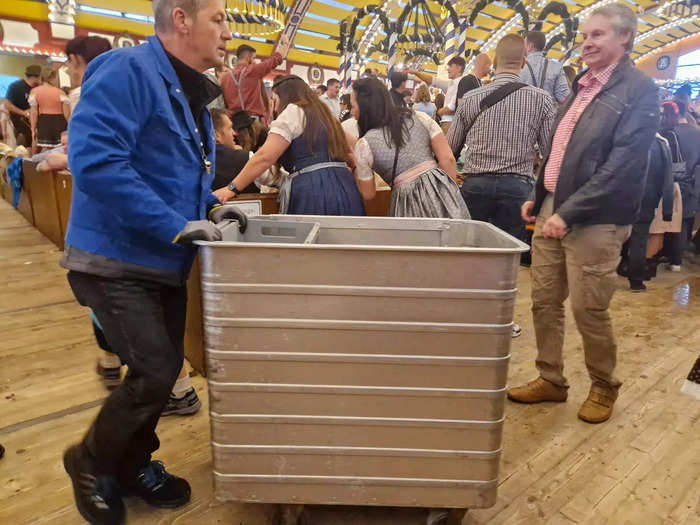
The Oktoberfest staff carried huge amounts of beer around the tents and corralled drunken patrons to the best of their abilities.
Getting nearly run over by one of their metal trolleys — which were full of crockery or steins, the name for the two-liter stoneware jugs of beer — was pretty much an Oktoberfest rite of passage.
The festival offered plenty to eat, drink, and do for visitors who aren't keen on beer.
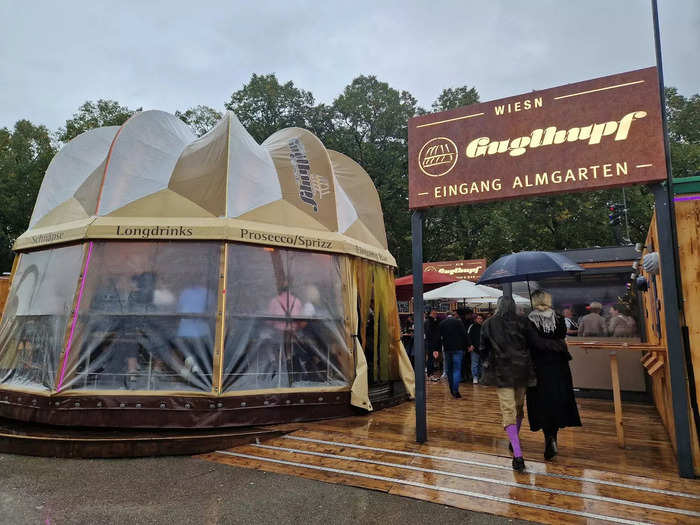
If you don't want to drink beer, there's still plenty to take in at Oktoberfest, Some tents sell wine and prosecco, and there are also rollercoasters and other festival rides.
Theresienwiese also had kid-friendly activities and sweet treats for everyone to enjoy. The chocolate-covered fruit, which was about $6 per serving, was my favorite.
The food stalls were one of the best parts of the festival.
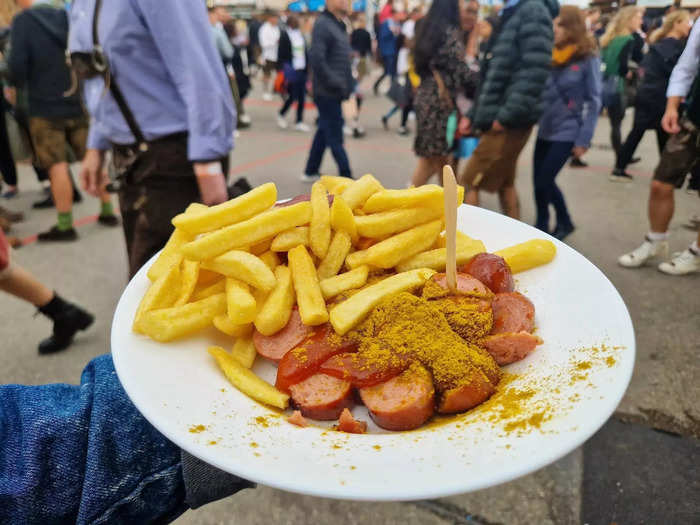
I could fill this entire article with photos of the delicious food I ate at Oktoberfest.
From Bratwurst, German-style sausage, and Currywurst to chocolate-covered fruit and roasted nuts, the snacks and meals were wonderful.
In my experience, the food and beverage prices seem to have risen each year, and this year they were they were the highest I've seen yet.
At my first Oktoberfest, I bought a stein of beer for as little as $9 and food for around $5 per plate. This year, a stein of beer cost about $13, and a plate of Currywurst and chips cost around $10.
I could've forgotten to visit the beer tents altogether and spent the whole day at the food stalls instead.
The energy inside the tents was contagious, and I even witnessed a marriage proposal.
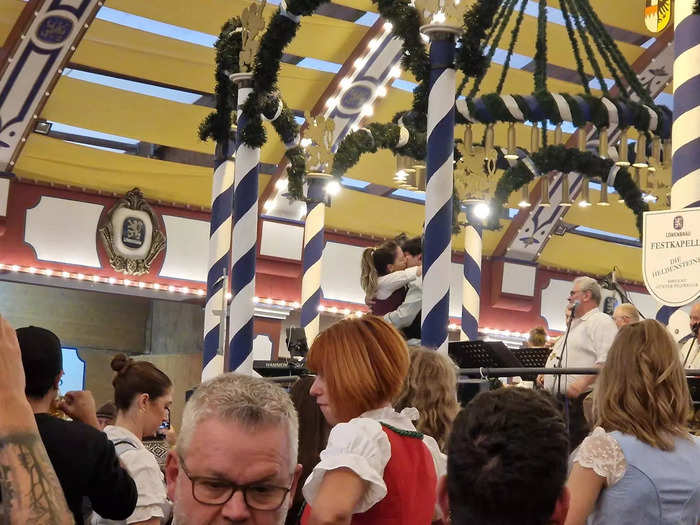
Whether the crowd was in the midst of a drinking game or singing along to Robbie Williams' song "Angel," energy thrummed through the Oktoberfest tents.
People were ready to make new friends, chat with people from other countries, and invite strangers to sit at their tables. There's truly no energy like the energy at Oktoberfest.
With all this mingling and celebration, it was no surprise that a couple got engaged on one of the festival's final days. One of them popped the question over the musicians' speakers, and the entire crowd cheered louder than they did for any song.
At the end of a long beer and pretzel-fueled day, I was in a queue once again.
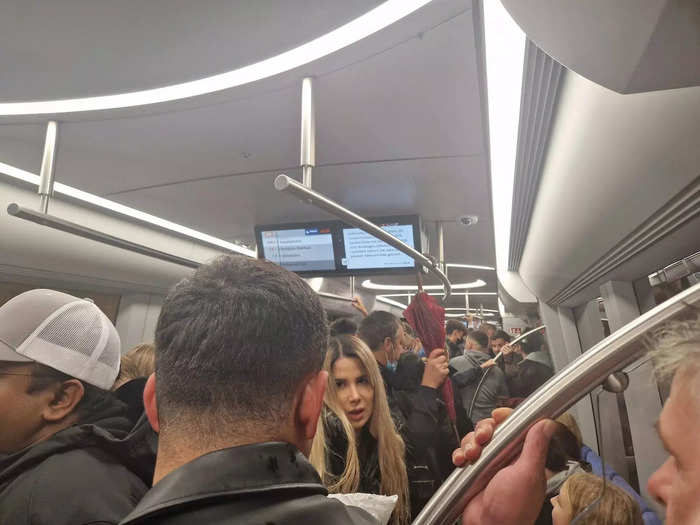
My day at Oktoberfest ended the same way it started: standing in a line.
When I reached the station, I took an uncomfortably full train 10 minutes back to Munich. At least this time, I was full of beer and pretzels.
Popular Right Now
Popular Keywords
Advertisement